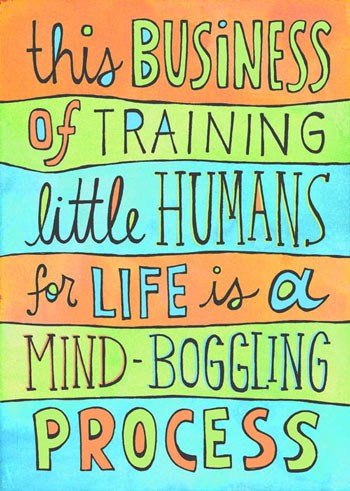
I think I have the best job in the world: I get to help parents raise the next generation and I’ve worked with a lot of moms and dads. I’ve spoken to over one million participants on five continents, appeared on over 100 TODAY show parenting segments and written 22 books on child development. I’m also asked for advice and over the years (regardless of country or demographics) I’ve learned that the topics are the same.
So here are my top favorite parenting tips — the ones that seem to resonate with moms and dads at workshops, asked for most often and retweeted most on twitter. They’re just a sample of the hundreds of proven and simple tips from my books, The Big Book of Parenting Solutions and Parents DO Make A Difference. The best news is that these solutions work for all ages, take less than a minute to do, are based on proven research and when consistently used will reap lasting change.
All the best in the most important role of your life: parenting!
My All-Time Favorite Parenting Advice
1. Get attention: Lower your voice almost to a whisper and then say your request. Kids aren’t used to a quiet request. (It’s an old teacher trick and is surprisingly effective).
 2. Increase positive behavior: Research shows that giving kids the right kind of praise (called “positive reinforcement”) is one of the best ways to shape new behavior. So, catch your kid doing the action you want. Just make sure your praise is specific and tells your child exactly what he did right. (Adding “because” or “that” takes your praise up a notch. “I’m so impressed that you started your homework all by yourself this time.”)
2. Increase positive behavior: Research shows that giving kids the right kind of praise (called “positive reinforcement”) is one of the best ways to shape new behavior. So, catch your kid doing the action you want. Just make sure your praise is specific and tells your child exactly what he did right. (Adding “because” or “that” takes your praise up a notch. “I’m so impressed that you started your homework all by yourself this time.”)
3. Stretch persistence: Praising the child’s effort (“You’re working so hard”) and not inherent intelligence (”You’re so smart”) is proven to enhance perseverance and performance, but the child is also more likely to bounce back from a mistake—all because he feels success is not mixed.
4. Reduce fear: Expose your child to a fear in small manageable doses and help them develop a statement to speak back to the worry (“Go away worry!” or “I can do this!”)
5. Curb a tantrum: The longer you give attention to a tantrum the longer it lasts. Ignore, ignore, ignore!
6. Nurture kindness: Encourage your child to use the Two Praise Rule everyday. “Say or do at least two kind things to someone.” Random acts of kindness really are catchy!
7. Increase assertiveness: Stress: “Look at the color of the talker’s eyes.” Using eye contact helps kids appear confident. Strong body posture also helps a child be less likely to be bullied.
8. Friendship builder: The two most commonly used traits of well-liked kids are “smiling” and “encouraging.” Reinforce those traits in your child to boost his friendship quotient.
9. Develop healthy eating habits. Eating relaxed family meals regularly enhances kids’ psychosocial well- being, boosts grades and deters behaviors like smoking and drinking and eating disorders as well as teaches the child healthy eating habits.
10. Curb nagging. Say “no” the first time and don’t back down. The average kid nags nine times knowing the parent will give in. Don’t!
11. Look for the positives. Focus on what is good about your child. Your child uses your words to form the images about himself.
12. Recognize your influence. Ask yourself each evening, “If my child’s self-beliefs were based only on my words and actions today, what would he believe about himself as a human being?”
13. Reinforce positive efforts. Our kids’ need to believe we love them whether they succeed or fail. Every effort your child makes increases the possibilities that he will succeed. Reinforce his positive efforts.
14. Accept what makes your child unique. Recognize that your child’s strengths may lie in areas that don’t reflect your own personal preferences. Nurture his strengths.
 15. Be emotionally available. One of the greatest way to encourage our children to speak up as well as to nurture their self-esteem is to show them we want to hear their ideas.
15. Be emotionally available. One of the greatest way to encourage our children to speak up as well as to nurture their self-esteem is to show them we want to hear their ideas.
16. Avoid rescuing your child by solving his problems for him. Reassure him you are nearby, but challenge him to solve problems himself.
17. Stay calm and show your children how to deal successfully with frustrations. Example is always the best teacher and your children are watching you closely.
18. Stress the failure is ok. Explain mistakes don’t mean failure, but instead can be learning opportunities in disguise.
19. Be a safety net. Remind kids it takes courage to try something you don’t feel confident doing. Stand by to support their triumphs – as well as their losses – they are all part of growing up.
20. Use discipline as a teaching tool. Apply it to teach your child to be responsible and learn from his misbehaviors.
21. Expect your child to care and lend a hand to make the world a better place. Children don’t learn how to be caring from reading about it in a textbook, but from doing caring deeds.
22. Be consistent. Target specific behaviors that would help your child become his personal best then consistently reinforce them. Habits take time to change: have patience but don’t give up.
23. Stress others. Help your child discover the positive traits about people and teach him from the time he is very young that no one is better than any other person.
24. Encourage service. Look for ways for your child to do kindly deeds, not just in your home but also in your community–taking extra toys to a children’s ward in a hospital, working at a soup kitchen, planting flowers at a shelter, raking the elderly neighbor’s lawn. There is nothing more empowering or esteem-enhancing that helping a child recognize the positive difference he can make on others. The more your child experiences the miracles of kinds when young, the greater the likelihood she will make kindness a habit for life.
 25. Expect kindness. Take a active stand against cruelty and just plain do not allow it. Expect and demand that children treat all living beings in a moral and caring manner.
25. Expect kindness. Take a active stand against cruelty and just plain do not allow it. Expect and demand that children treat all living beings in a moral and caring manner.
26. Stress face to face communication. Set clear curfews on technology and identify sacred “unplugged” places where everyone in your family is unplugged and can communicate face to face.
27. Develop inner motivation. Refrain from always giving tangible rewards for your child’s efforts. Help her develop her own internal reward system in which she acknowledges herself for a job well done.
28. Stretch moral growth. Kids need practice making moral decisions, so help your child think through the possible outcomes and then guide her toward making safe and right choices; this way, she will eventually learn to act right without your help.
29. Expand your child’s emotional intelligence. Ask often: “How do you feel?” Later: “How do you think he feels? What does he need to feel better?” Children must be able to identify different emotional states in themselves before they can become sensitive to the feelings of others.
30. Nurture empathy. To teach kids empathy, you must show kids empathy. Kids learn empathy best by witnessing or experiencing it. The best moments to teach empathy are usually not planned–they just happen. Capitalize on those moments to help your child understand the power that “feeling with others” can have.
Most important parenting tip: No one–absolutely no one–knows your child better than you. Use your instinct. Act on it! Listen to heart when it comes to child-rearing. It will never let you down!
Tweet Your Own Favorite Parenting Tips!
 So what’s your favorite parenting tip? We’re all in this glorious business of raising kids together, so pass on what works…the best advice we’ve ever been given about raising kids. Better yet, share it on twitter with the hashtag #parentingtip. You can follow me on twitter @MicheleBorba where I’ll be tweeting parenting tips everyday as well as retweeting your advice.
So what’s your favorite parenting tip? We’re all in this glorious business of raising kids together, so pass on what works…the best advice we’ve ever been given about raising kids. Better yet, share it on twitter with the hashtag #parentingtip. You can follow me on twitter @MicheleBorba where I’ll be tweeting parenting tips everyday as well as retweeting your advice.
These tips are culled from two of my books, The Big Book of Parenting Solutions and Parents DO Make a Difference. For more information, please see my website: Michele Borba.

